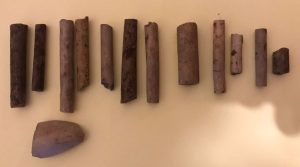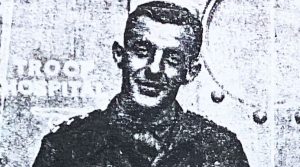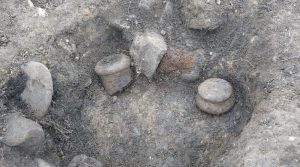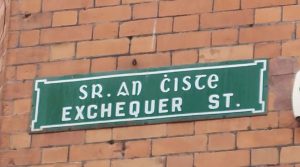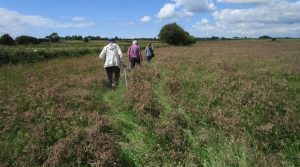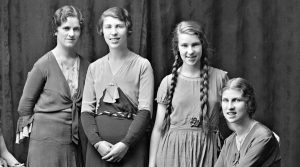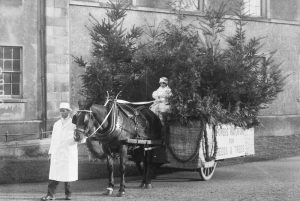Trinity College Dublin has secured €200,000 in funding to facilitate the preservation of the personal archive of journalist Robert Fisk. Best known for his coverage of conflicts in the Middle East, the archive also includes material related to his work in Northern Ireland during the early years of the Troubles.
Trinity College Dublin has received €200,000 in funding from the Department of Further and Higher Education, Research, Innovation and Science to support the conservation of the personal archive of the distinguished late journalist and Trinity graduate Robert Fisk and his wife, Nelofer Pazira-Fisk.
A D V E R T I S E M E N T
Robert Fisk received a PhD in political science from Trinity College Dublin in 1983 for his thesis “A condition of limited warfare: Eire’s neutrality and the relationship between Dublin, Belfast and London, 1939–1945“. It was subsequently published as a book, In Time of War: Ireland, Ulster and the Price of Neutrality 1939-45, which went on to receive critical acclaim and was reprinted a decade later by Gill & Macmillan.
In the book, Fisk explores the complexities of Irish neutrality during World War 2. When Britain handed over the naval ports of Cobh, Berehaven and Lough Swilly to Ireland in 1939, the Irish celebrated, but just 18 months later, Churchill considered military action to demand the return of the ports, and the Irish prepared for possible invasions by both Britain and Germany. Meanwhile, Northern Ireland’s Unionist government unsuccessfully attempted to introduce conscription, British submarines patrolled the western coast for German U-boats, and both British and German agents were searching for sympathizers in Ireland for their respective causes.
>>> READ MORE: Healing hands on the frontlines: Cork medical graduates in World War 2
Sign up to our newsletter
From the late 1970s to 2020, Fisk was one of the leading foreign correspondents covering the Middle East for UK and Irish media. Based in Beirut, he reported on major conflicts and uprisings across the region, including events in Iran, the Gulf, Lebanon, Bosnia, Kosovo, Afghanistan, Gaza, the 2003 US invasion of Iraq, the Arab Spring in 2011 and the Syrian War.
A natural historian, archivist and diarist with a deep appreciation for the importance of sources, Fisk developed the habit early on of gathering and preserving all materials of interest. He discarded nothing and took notes on everything, even phone conversations. At their home in Dublin, the Fisks designed a spacious, custom-built area, carefully controlled for light and temperature, to protect their archive and library.
Although much of the archive encompasses material from Fisk’s time in the Middle East, it also includes material relating to his first posting in Belfast in 1972 for the London Times. The collection forms a rich historical record, capturing the political landscape and conflicts of early 1970s Northern Ireland and the Middle East from the late 1970s through to 2020.
A F F I L I A T E A D V E R T I S E M E N T

The archive, spanning Fisk’s 50-year journalistic career, contains an extensive range of notebooks, research notes, photographs, news clippings, audio files of interviews, drafts for published works, letters and emails. The collection also includes salvaged items and artefacts such as explosives shells. Donated to the Library of Trinity College Dublin by his wife, Nelofer Pazira-Fisk — who is also a journalist, author and documentary-maker — she commented:
“Robert and I often discussed our wish to pass on our archive so the future generations could make use of it with the hope that it will foster questioning and debate. And that knowledge of history enables humanity to say no to violence of all kinds. Robert had an affinity with Ireland and a great admiration for Trinity College Dublin as a place of knowledge. I am pleased that Trinity has agreed to be the custodian of this collection.”
There is extensive work involved in cataloguing, conserving, preserving and digitizing an archive of such significance. Helen Shenton, librarian and college archivist, explained that the Library of Trinity College will ensure the physical and digital preservation of this archive and make it fully accessible as soon as possible to readers and researchers in-person through the Research Collections Study Centre and online through the Virtual Trinity Library programme. The funding will provide Trinity with the necessary resources to undertake this work.
A D V E R T I S E M E N T
The Minister for Further and Higher Education, Research, Innovation and Science, Patrick O’Donovan TD, announced the funding at Trinity’s Eavan Boland Library today, 5 November, with Nelofer Pazira-Fisk, Helen Shenton and Trinity Provost Dr Linda Doyle in attendance. Minister Patrick O’Donovan said:
“This is an exciting day for Trinity, and I am thrilled to announce this funding, which will enable the donation of this historic archive to proceed. Robert Fisk was a celebrated journalist who spent over 45 years as a leading foreign correspondent for UK and Irish media, notably covering the Middle East from his base in Beirut.”

Dr Linda Doyle added:
“We are honoured that Nelofer Pazira-Fisk has donated this archive to Trinity. It will advance teaching and research into the conflicts covered by Robert Fisk over so many years and will act as a vital resource for researchers, policymakers and the public. Today’s announcement will contribute to the archive’s conservation and accessibility for the future.”
Advertising Disclaimer: Irish Heritage News is an affiliate of FindMyPast – we earn commissions from qualifying purchases. This does not affect the amount you pay for your purchase.
READ NOW
➤ A real Halloween horror: the manslaughter case that shook Fermanagh in 1916
➤ A guide to navigating Northern Ireland’s church records
➤ Fr Lorcán Ó Muireadhaigh and the founding of “An tUltach” (The Ulsterman) in 1924
➤ Exploring Castle Caulfield: Toby Caulfeild’s 17th-century mansion in Tyrone
A D V E R T I S E M E N T




